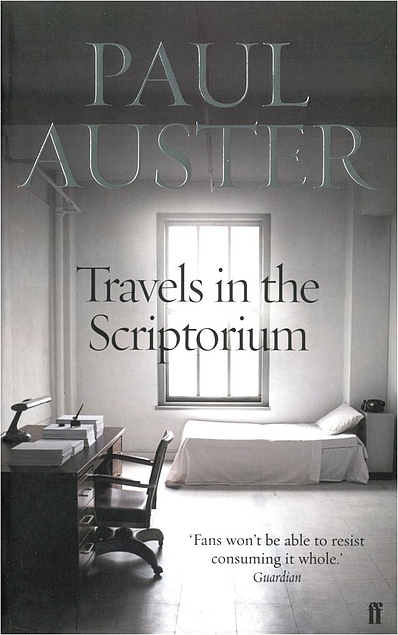Paul Auster "Travels in the Scriptorium" (Faber & Faber)

This was my second experience of Paul Auster and my appetite has certainly been whetted. More novella than a novel, this slim book tells the story of a day in the life of Mr. Blank. An old man, he sits in a sparsely furnished room with no idea of who he is or where he is. He can't tell whether he is a prisoner or a guest, and he is connected to the wider world only through the series of people who come to visit him. To say much more would be to risk giving things away. There is something very stylized about the action, in which every small gesture or action is faithfully recorded, but this doesn't bother me too much because Mr Blank is starting from scratch, almost, and everything may have significance. Perhaps the thing which I did find tiresome was Auster's emphasis on Mr. Blank's bodily functions, which I don't believe we need to know about in quite so much detail.
On the plus side, this is a quirky, clever story that simply presents a series of facts and leaves the reader to gradually draw their own conclusions. Although I might have found the knowing conceit a bit trying if it had lasted throughout a full-length novel, Auster gets away with it here. His blend of playfulness and pathos reminded me a bit of Borges, although I suspect that comparison also sprang to mind because of the themes of reading and reality that underpin Mr. Blank's existence. In the long run, this book probably won't stick in my mind, but it provided a welcome diversion, and I'll certainly be more likely now to give the rest of Auster's novels a try.

This was my second experience of Paul Auster and my appetite has certainly been whetted. More novella than a novel, this slim book tells the story of a day in the life of Mr. Blank. An old man, he sits in a sparsely furnished room with no idea of who he is or where he is. He can't tell whether he is a prisoner or a guest, and he is connected to the wider world only through the series of people who come to visit him. To say much more would be to risk giving things away. There is something very stylized about the action, in which every small gesture or action is faithfully recorded, but this doesn't bother me too much because Mr Blank is starting from scratch, almost, and everything may have significance. Perhaps the thing which I did find tiresome was Auster's emphasis on Mr. Blank's bodily functions, which I don't believe we need to know about in quite so much detail.
On the plus side, this is a quirky, clever story that simply presents a series of facts and leaves the reader to gradually draw their own conclusions. Although I might have found the knowing conceit a bit trying if it had lasted throughout a full-length novel, Auster gets away with it here. His blend of playfulness and pathos reminded me a bit of Borges, although I suspect that comparison also sprang to mind because of the themes of reading and reality that underpin Mr. Blank's existence. In the long run, this book probably won't stick in my mind, but it provided a welcome diversion, and I'll certainly be more likely now to give the rest of Auster's novels a try.